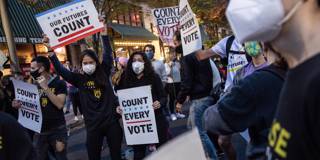OnPoint Subscriber Exclusive
The Big Picture brings together a range of PS commentaries to give readers a comprehensive understanding of topics in the news – and the deeper issues driving the news. The Big Question features concise contributor analysis and predictions on timely topics.

The Trumpian Persuasion
The hotly contested – but so far peaceful – US presidential election on November 3 generated historically high turnout and will most likely result in a victory for Democratic challenger, Joe Biden. But the election is no less important for what the strength of President Donald Trump’s popular support implies about the electorate and the future of American democracy.
In this Big Picture, Nina L. Khrushcheva of The New School says Trump’s higher vote tally compared to 2016 suggests he may be a master of propaganda, and not – as many Democrats like to think – a mere lackey of Russian President Vladimir Putin. What he clearly is, says psychiatrist Raj Persaud, is a narcissist, which explains why baseless allegations of electoral fraud make perfect psychological sense for him and many of his diehard supporters. And Princeton University’s Harold James reflects on how Trump’s constant stream of lies and falsehoods – the narcissist’s stock in trade – has made normal politics effectively impossible.
Looking ahead, Princeton’s Jan-Werner Mueller warns that taking a “forgive and forget” approach to Trump’s many transgressions while in office could carry high costs for the US political system. Likewise, New York University’s Ruth Ben-Ghiat argues that only by accepting the reality of the authoritarian turn in American politics under Trump’s presidency can further democratic erosion be combatted.
The University of Chicago’s Eric Posner argues that any attempt by a Biden administration at meaningful progressive reform will fail, owing to opposition from congressional Republicans and a right-wing Supreme Court. And with the risk of a seriously business-unfriendly agenda now seemingly off the table, note Willem H. Buiter of Columbia University and Anne Sibert of Birkbeck, University of London, it is little wonder that markets are in buoyant mood.
Finally, Richard Haass of the Council on Foreign Relations compares the situation in the United States today to the United Nations Security Council: Many agree that the current system is deeply flawed and unrepresentative, but the country’s deep divisions make it impossible to reach consensus on reform.